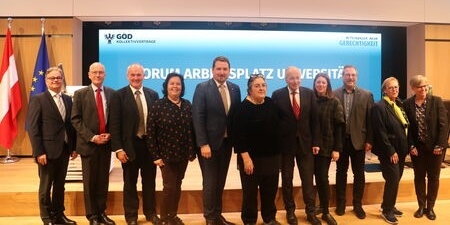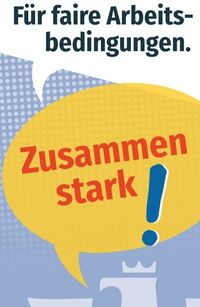BL13-News 01/24
Information by the University Union
The Federal Executive Board 13, Bundesleitung 13 or BL13 for short, the representation of the University Union, i.e. the academic and artistic university staff in the Public Service Union GÖD, is pleased to be able to inform you directly as a member of this section.
In this first issue of BL13 News, we provide a brief overview of our activities, reviews of the last collective bargaining negotiations and of an event organized by the GÖD Executive Board on 14th of November 2023, entitled "Universities as a workplace". We also provide an outlook on our key topics and provide information about a survey on the union's work, which you can influence by taking part.
The BL13 editorial team looks forward to your feedback via e-mail to redaktion.bl13symbolgoedpunktat!
Die Bundesleitung 13, kurz BL13, die Vertretung des wissenschaftlichen und künstlerischen Universitätspersonals in der Gewerkschaft Öffentlicher Dienst, freut sich, dich als GÖD-Mitglied direkt informieren zu können. In dieser ersten Ausgabe der BL13-News geben wir einen kurzen Überblick über unsere Aufgaben, einen Rückblick auf die letzten Kollektivvertragsverhandlungen sowie auf eine Veranstaltung des Präsidiums der GÖD mit dem Titel „Arbeitsplatz Universitäten“ vom 14. November 2023. Wir geben einen Ausblick auf inhaltliche Schwerpunkte, ein im Mai 2024 geplantes Dialogforum und informieren über eine Umfrage zur Gewerkschaftsarbeit, auf die du durch deine Teilnahme Einfluss nehmen kannst. Das BL13-Redaktionsteam freut sich über Rückmeldungen via eMail an redaktion.bl13symbolgoedpunktat! ⮞ zu den Infos in Deutsch |
Review of the collective agreement negotiations for 2024
What did we achieve?
On December the 18th 2023, the Public Service Union (GÖD) and the University Federation (Dachverband) agreed in a second round of negotiations on a nominal increase in actual salaries of 9.2% starting with February 1st 2024.
This percentage is slightly higher than that of the public sector of 9.15% (except for the lowest salaries), but comes into force one month later. In a direct comparison, the valorizations of the collective salaries for the coming year are therefore about 1/12 below those of public sector. The negotiations for the coming years will continue to fight to return to January 1st as the cut-off date for salary increase.
On the part of the University Federation there were new faces at the negotiation table. The University Federation represents 22 universities of the universities act (Universitätsgesetz, UG) and there were some personnel changes in fall. On the side of the union, the negotiating team of recent years was relied on, completed by the new GÖD chairman Eckehard Quinn. As usual, representatives of the Federal Executive Board 13 (BL13) were present in an advisory function.
In addition to the annual salary negotiations, substantive improvements to the university collective agreement (Kollektivvertrag, KV) were also put on the agenda. These complex issues were postponed to separate talks in 2024. Some have already taken place.
The GÖD has been calling for an improvement in working conditions for years, and not just at universities. Specifically, for example, the revision of the B-Scheme (§ 49 of the collective agreement for universities) is being negotiated. The B-Scheme is the basis of which the vast majority of academic and artistic staff are paid: Pre- and post-docs, i.e. lecturers, university assistants, project staff, senior scientists, senior artists and senior lecturers.
Salary advancements for post-docs are far apart in terms of time, but in the current scheme the highest possible salary level is reached after 16 years, this level is also very low compared to AHS teachers. The BL13 has therefore been calling for years for the B-Scheme to be made more attractive. More information on salary comparisons can be found at https://unigewerkschaft-bv13.goed.at/themen/attraktive-entlohnung.
BL13 strongly calls for the B-Scheme to be made more attractive and to introduce more and better progressions. From the union's perspective, these adjustments are unavoidable in order to position universities as attractive employers in an increasingly competitive labor market. The negotiations will not be easy. We will report on the progress and results as soon as possible.

University as a workplace
GÖD event with the Austrian science speakers
In November 2023 the GÖD Executive Board took a new approach to discuss the concerns of university employees. They invited the political representatives, the science speakers, from all parties represented in the Austrian National Council to a GÖD forum - see also https://www.goed.at/aktuelles/news/forum-arbeitsplatz-universitaeten
The aim of this event was to provide information about the challenges and possible solutions for fair and suitable workplaces at universities and to discuss possible solutions in a panel discussion.
Martin Tiefenthaler, Chair of the Federal Execution Board 13, BL13 , gave an insightful introduction to the challenge of fair pay for the majority of the scientific and artistic staff. Stephan Pühringer, co-founder of the NuWiss platform and winner of a Start Prize 2023, also pointed out the precarious situation of many young scientists and artists at Austrian universities. He illustrated this with several examples. The overcautious and risk-averse hiring practices of the rectorates at the individual locations on the one hand and the massively increased international competitive pressure for positions and funding for research topics on the other hand have led to a climate that is hostile to innovation. Tiefenthaler and Pühringer have made an urgent plea to finally create conditions for a good personnel policy and to improve the financing of universities and university research.
On the podium, the three political representatives who followed the invitation (Rudolf Taschner - ÖVP, Eva Blimlinger - Die Grünen, Katharina Kucharowits - SPÖ) discussed in particular impulses for reducing temporary employment, designing an attractive wage policy, financing options and also structural forms of co-determination and democratization. These topics and the need for action were clearly seen very differently by the political representatives.
This first-time exchange format was a very important contribution. We will support the GÖD Executive Board in organizing further forums.
It is important that you tell us your views on the very broad topic of "universities as a workplace" so that we can discuss precisely those topics that are central to you as those affected.
Therefore, please write to us at redaktion.bl13symbolgoedpunktat
- What are your reasons for wanting to work at a university?
- What changes would you like to see in your workplace at the university with regard to your working conditions?

Dialogue Forum 2024
Working Title: "Science and Arts: Valuing Working Conditions?"
We launched the dialog forum format in fall 2022. Topics such as dealing with and the consequences of fixed-term contracts or university funding have so far been the focus of these public information and discussion events. The results, including video recordings, can be found at https://unigewerkschaft-bv13.goed.at/dialogforum. We will focus on the working conditions and contracts of senior scientists and (senior) lecturers.
The next dialog forum is planned for May 15th 2024, from 1 to 5 p.m., , when 80% of employees are on fixed-term contracts, . If you are interested in this topic, please make a note of the date.
Details on the program will follow!

The professional representation within the GÖD
Who are we and what are we working on together?
With over 260,000 members, the Public Service Union (GÖD) is the second largest member of the Austrian Trade Union Federation ÖGB. It is powerful and enforcing.
The GÖD is divided into federal representations, each federal representation consists of all members in the respective area. The Federal Representation 13 (BV13, Bundesvertretung) comprises all members of the scientific and artistic university staff across Austria, while the BV16 represents the so-called general university staff. In accordance with the statutes, all federal representations elect representatives every five years, the Federal Executive Boards (BL, Bundesleitung). These collect and prepare the demands of their members for the Excutive Board of the GÖD. In the area of universities, these are the Federal Executive Board 13 (BL13, i.e. us) and the BL16.
From a legal point of view, the University Act (UG, Universitätsgesetz) codifies that the Federation of Universities negotiates the collective agreement with the GÖD, which, in addition to the UG and other laws, determines and regulates the legal basis of our employment relationships. As a voluntary representation of interests, we are committed to improving working conditions for all university staff in the interests of the employees, but within the framework of Austrian law.
The trade unions contribute the specific perspective of employees into the collective legal process, uses its expertise to effectively support the works councils in their work and also provides legal advice and legal representation for members in individual cases.
The catalogue of demands of the Federal Executive Board 13 includes the urgently needed improvement of the situation of employees. Involving the works councils at the individual universities in the decision-making process is an important concern for us. Making remuneration schemes more attractive and better consideration and recognition of experience and expertise in salary advancements is a key issue. The long-standing demand for more courageous and forward-looking personnel planning and policies at the individual locations is also relevant. at Austrian universities.
Furthermore, the sustainable financing of universities is one of the fundamental concerns of the Federal Executive Board, whereby particular attention must be paid to eliminating the continuing disadvantages for the outsourced companies of the public sector.

Motivational research on trade union work
Invitation to participate in the study
The project "Research motives for membership or non-membership in a union", especially in the GÖD, has been launched. Under the scientific direction of Ursula Rami (Institute of Sociology, JKU Linz), an anonymous ⮞ online survey is being carried out using state-of-the-art sociological methods. All scientific and artistic staff are invited to take part in the survey - regardless of whether they are GÖD members or not. Participation is voluntary and of course anonymous, i.e. there will be no evaluation of personal data! Information on participation will be distributed via the Federal Execution Board BL13 and the works councils at your university. The Federal Execution Board BL13 supports this project. The results of the survey will be incorporated into the union's work in the spirit of a dialog-oriented approach.
The link again ⮞ https://www.unipark.de/uc/Gewerkschaftsarbeit/
How to get into touch?
On information on the university union's demands for scientific and artistic staff, please visit https://unigewerkschaft-bv13.goed.at/themen.
Contact details of the representatives can be found at https://unigewerkschaft-bv13.goed.at/team